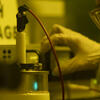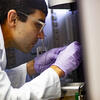Scope of Research
The Smart Biomaterials Research Laboratory studies how biomaterials interact with the body, and it develops smart materials that enhance the treatment and diagnosis of diseases and injuries. Working at the intersection of advanced materials, microbiology, medicine and sensors, the lab is developing smart materials that provide:
- antibacterial and antifungal effects;
- biodegradable, dose-controlled drug delivery via oral appliances;
- tissue regeneration and remineralization; and
- oral biosensors.
Research efforts on smart materials are also focused on shifting the oral microbiome toward balanced states that prevent infection and disease. Technology being developed at the lab include oral biosensors and smart brackets used in orthodontics. Researchers have expertise in
- 3D printing,
- confocal microscopy,
- fabrication of advanced materials,
- microbiology,
- scaffolding,
- sensing and electronics, and
- testing and evaluation.
The 1,000-square-foot Smart Biomaterials Research Laboratory is fully equipped for the fabrication, testing and evaluation of smart biomaterials in realistic body conditions. The facility is outfitted with several pieces of major equipment that include 3D printers, oscilloscopes, an incubator, a microindenter and a bioreactor hooked to a mastication machine. There is also equipment designed to test various types of materials, such as biological tissues, ceramics, implants, polymers and resins.
Researchers have access to resources at the College of Engineering, the Lewis Katz School of Medicine and the Fox Chase Cancer Center. The lab is engaged in active collaboration with the Oral Microbiome Research Laboratory to test novel dental smart biomaterials exposed to multispecies biofilm.



